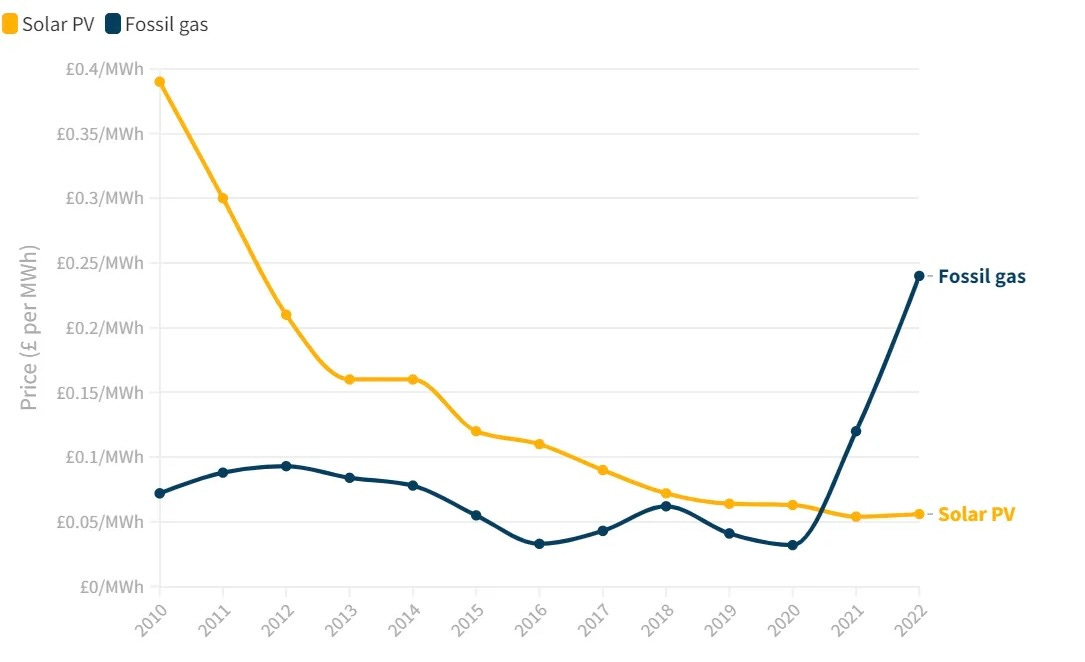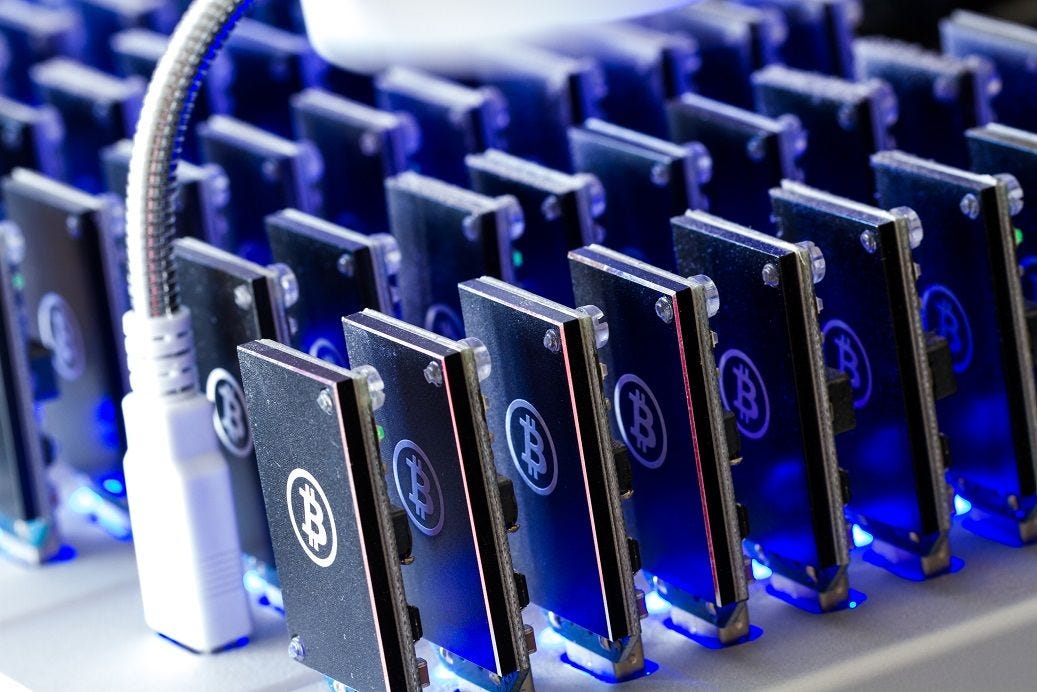In recent months, Bitcoin has faced a barrage of criticism for its perceived negative impact on the environment. Greenpeace recently added fuel to the fire by commissioning this Skull of Satoshi art piece.
Critics like Greenpeace argue that Bitcoin mining consumes too much energy, often sourced from fossil fuels, contributing to climate change and exacerbating environmental issues.
However, when you dig deeper, it can be argued that these concerns are primarily based on misconceptions and a lack of understanding of Bitcoin’s true potential.
To balance the debate, we also need to look at the environmental benefits of Bitcoin - yes, they exist, albeit they are lesser known!
Embracing renewable energy
Reducing energy wastage
Decentralising the energy grid
Driving innovation in energy efficiency
Offering an alternative to the banking system
1. Embracing renewable energy
Unless you live under a rock, you’ll have noticed that oil and gas prices shot through the roof last year. As Bitcoin miners profit by converting electricity into Bitcoin, this was terrible news for their profitability.
The cheaper the energy, the more profit miners can make, leading them to search for affordable alternatives.
With the price of renewables, such as solar, dropping against the cost of fossil fuels like gas over recent years, it doesn’t take a genius to tell miners which option to favour.
In places abundant with renewable energy, Bitcoin mining boosts demand, spurring further investment in renewable energy production.
For example, the state of Washington in the United States, known for its abundant hydropower resources, has attracted many Bitcoin mining operations. This increased demand has, in turn, led to further investment in renewable energy projects in the region.
Ultimately, Bitcoin mining is incentivising the adoption of renewable energy sources. By seeking out low-cost energy options, the mining industry is helping to drive the global transition towards a more sustainable future.
2. Reducing energy wastage
However, one issue with renewable energy sources is that they are often intermittent — sunlight and wind availability vary throughout the day. As renewable energy is difficult to store or transport, this often results in surpluses in supply and subsequent waste.
By adjusting mining operations to align with high energy generation periods, Bitcoin miners effectively create a valuable sink for excess energy, optimising energy consumption and reducing wastage.
Bitcoin also helps mitigate the environmental impact of fossil fuel extraction, particularly in the case of natural gas. In remote oil wells, excess natural gas is often flared off due to the lack of infrastructure needed to transport it.
Flaring releases greenhouse gases which contribute to climate change. Bitcoin miners, like these two Texans who made $4m, can harness wasted natural gas to generate electricity, significantly reducing greenhouse gas emissions.

In essence, the industry contributes to a more efficient and environmentally conscious energy landscape by using excess and stranded energy.
3. Decentralising the energy grid
Traditional energy grids rely on a few large-scale power plants to create electricity. This centralised approach causes inefficiencies and vulnerabilities, as power generation is concentrated in specific locations.
Europe experienced this first-hand with the war in Ukraine recently, when sanctions and the blowing up of the Nord Stream pipelines led to a full-blown crisis in many countries.
The risks aren’t limited to geopolitical events either - winter storms in Texas recently left millions without heat or water for days when storms overwhelmed the state’s centralised energy grid.
In contrast, Bitcoin mining can be set up anywhere with the internet, creating demand for energy in dispersed locations worldwide. This, in turn, encourages the development of a decentralised grid to meet that demand and the needs of the wider global population.

By creating a decentralised mining network, Bitcoin can foster greater grid resilience, promote local renewable energy projects, and increase energy efficiency. Take that, Russia!
4. Driving innovation in energy efficiency
Bitcoin mining drives innovation in energy efficiency, as miners continuously seek to maximise profits by minimising energy consumption.
As the mining process becomes more computationally intensive, the demand for high-performance, energy-efficient hardware grows.
In response, technology companies have designed increasingly sophisticated mining equipment, such as Application-Specific Integrated Circuits (ASICs), optimised for energy efficiency and mining performance.
These advances in hardware reduce the overall energy consumption of the mining process. In fact, Bitcoin mining has increased efficiency by almost 5,814% since 2013.

Bitcoin mining has also spurred innovation in energy management practices. For example, miners now use advanced cooling systems to reduce the energy required to maintain optimal operating temperatures for their equipment.
These innovations are not limited to the cryptocurrency industry; they can also be applied to other sectors. For instance, the advances in cooling technology developed for Bitcoin mining can be utilised in data centres, reducing their energy consumption and environmental impact.
Therefore, technological innovation sparked by Bitcoin miners' demand can reduce global production's environmental impact as these technologies become more widespread.
5. Offering an alternative to the banking system
Critics tend to ignore traditional finance's environmental challenges when focusing on Bitcoin's energy consumption.
Traditional banking requires a vast physical infrastructure of branches, ATMs, offices, and data centres notorious for their high energy consumption and reliance on fossil fuels.
Moreover, banking generates substantial waste in the form of paper statements, receipts, and marketing materials. This waste contributes to deforestation and the associated release of greenhouse gases.

Finally, emissions associated with bank employees commuting to work, armoured vehicles transporting cash, and the movement of physical documents add to the overall carbon footprint of the traditional banking system.
As a digital currency, Bitcoin can streamline financial transactions and reduce the need for energy-intensive physical infrastructure, paving the way for a more sustainable and efficient financial system.
Bitcoin’s new mascot
I’m not claiming that Bitcoin mining is a net benefit to the environment. It obviously uses electricity. But misconceptions and limited understanding have often obscured the prevailing narrative around Bitcoin's environmental impact.
We must also recognise its potential to contribute to a more sustainable future by:
Promoting renewable energy adoption
Curbing energy waste
Decentralising and stabilising the grid
Fueling innovation in energy efficiency
Offering a greener alternative to traditional banking systems
Not only did Greenpeace's provocative jab amuse Bitcoiners, who embraced the skull as their mascot, but the artist has now admitted he was wrong about Bitcoin’s environmental impact.












Waste heat from miners can be reused for a purpose. We are doing that for years already.
We are reusing heat from computers to heat:
- central heating installations
- hot tap water
- swimming pools
- farms
- factories
Read more about immersion cooling on our page. If You have any questions do not hesitate contacting us.
https://flameit.io - FlameIT - Immersion Cooling